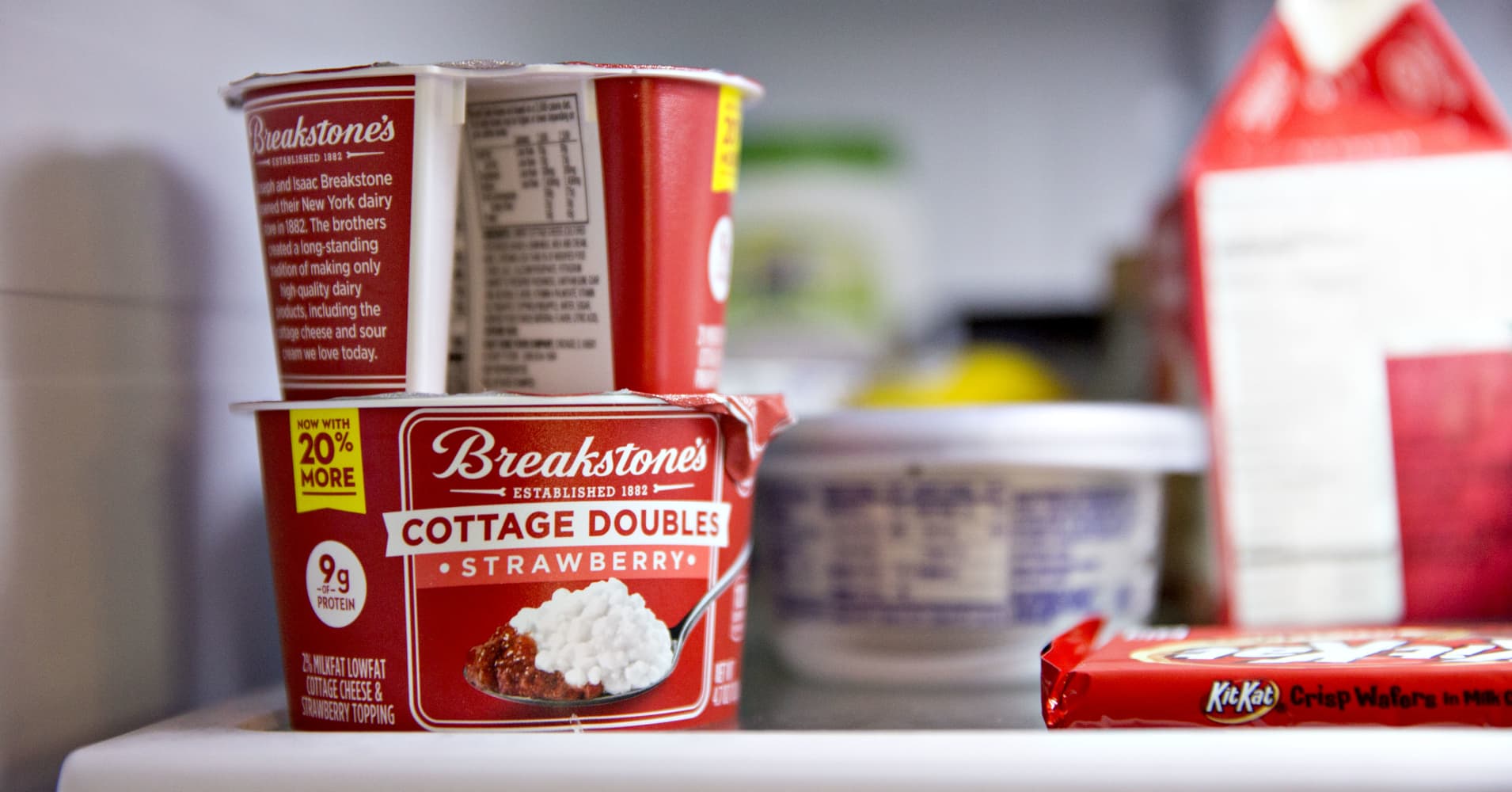
Kraft Heinz, as part of a broad overhaul, continues to put long-time brands on the block. One of the latest is its Breakstone's business, which sells cottage cheese, butter and sour cream.
Kraft Heinz has hired Royal Bank of Canada to review options for its Breakstone's business, which could include a sale, people familiar with the situation tell CNBC. The move is understood to be part of a broader review of the company's dairy business, which also includes its natural cheese business, the people said.
It comes as Kraft Heinz also weighs selling its Maxwell House coffee business, CNBC previously reported.
Breakstone's, which has roughly $400 million in revenue and $50 million in earnings before interest, taxes, depreciation and amortization, could fetch a valuation of roughly $400 million, the people said. It could appeal to dairy companies like Dean Foods, Saputo or national milk cooperative, Dairy Farmers of America, one of the people said.
Kraft Heinz last year announced the sale of its Canadian natural cheese business to Italian dairy group Parmalat for C$1.62 billion ($1.23 billion). The sale, along with lowered sales growth expectations for its cheese business, led the company to take a $4.1 billion impairment charge on the Kraft brand in February.
Dairy sales have slowed in recent years as U.S. diners increasingly eschew dairy products or look to non-dairy alternatives like oat, soy and almond milk. Those challenges are exacerbated by a multi-year period of weak milk prices.
The U.S. has a $1.4 billion cheese surplus, according to the U.S. Department of Agriculture. Sales of cottage cheese, meantime, have steadily declined since the days when it was a dieting favorite in the 1970's. At that time, Americans were eating an average of 5 pounds of cottage cheese a year, according to the USDA.
Shares of leading U.S. dairy producer Dean Foods, owner of brands like Organic Valley milk, DairyPure sour cream and TruMoo milk, have fallen 68 percent over the past year. The company, which has a market capitalization of $263 million, said it was exploring a sale earlier this month. It reported a net loss from continuing operations of $3.63 a share for 2018 and sales slipped 0.5 percent from the year prior.
The challenges in dairy are only one of the multiple issues Kraft Heinz is currently facing. Its shares are down 25 percent after the company delivered a triple whammy of bad news in late February — a significant earnings miss, dividend reduction and a $15 billion write-down that, in addition to Kraft, also included its Oscar Mayer brand.
Kraft Heinz was created by 3G Capital and Berkshire Hathaway, which bought H.J. Heinz in 2013 and merged it with Kraft two years later. 3G Capital developed a reputation in the U.S. for its "zero-based budgeting" process in which managers much justify every cost, every year. That approach to cost management was initially prized in the U.S. food industry, where industry executives acknowledged expenses had become bloated with extravagances like private planes and other costs.
But critics have argued 3G took its cost-cutting to an extreme, particularly in areas like research and development. That forced Kraft Heinz's brands to play defense at a time start-ups and retailers hawking their own brands were playing offense. At natural food convention Expo West last week, there were nearly 5,000 food companies vying for investor and consumer attention. Of those, there were 203 exhibitors promoting new cheese products, like Kite Hill nut milk cheese and Cypress Grove fresh goat milk cheese with lavender and fennel.
All of Big Food, from General Mills to Kellogg, has felt the squeeze as sales growth has slowed. But Kraft Heinz suffered a public fall from grace when Unilever rebuffed its acquisition approach two years ago, dinging its reputation and putting pressure on its stock price. In the interim, savings from its budgeting approach have stalled.
Adding to the pressure are rising commodity prices, which 3G critics have said the company prepared insufficiently for by focusing too much on cost-cutting and eventual dealmaking.
Now, Kraft Heinz is slimming its portfolio as it looks to bring leverage down to three times EBITDA, rather than the four times at which analysts say it is currently pegged. Analysts note it has $3 billion of debt coming due in 2020, which may have to be refinanced.
A prime focus for Kraft Heinz as it prunes its business are brands it views as commodities and no longer hold sway over consumers. Both coffee and dairy face immense competition from cheaper private label products or higher-end niche products. The Heinz brand, by contrast, has grown 26 percent over the past six years, according to Nielsen. One of Kraft Heinz's newest launches, Ore-Ida Just Crack An Egg breakfast, crossed $50 million in sales in less than 12 months.
The people asked not to be named because the information is confidential. A spokesperson for Kraft Heinz declined to comment. RBC didn't immediately respond to a request for comment.
from Top News & Analysis https://ift.tt/2CeW9Jqvia IFTTT
No comments:
Post a Comment